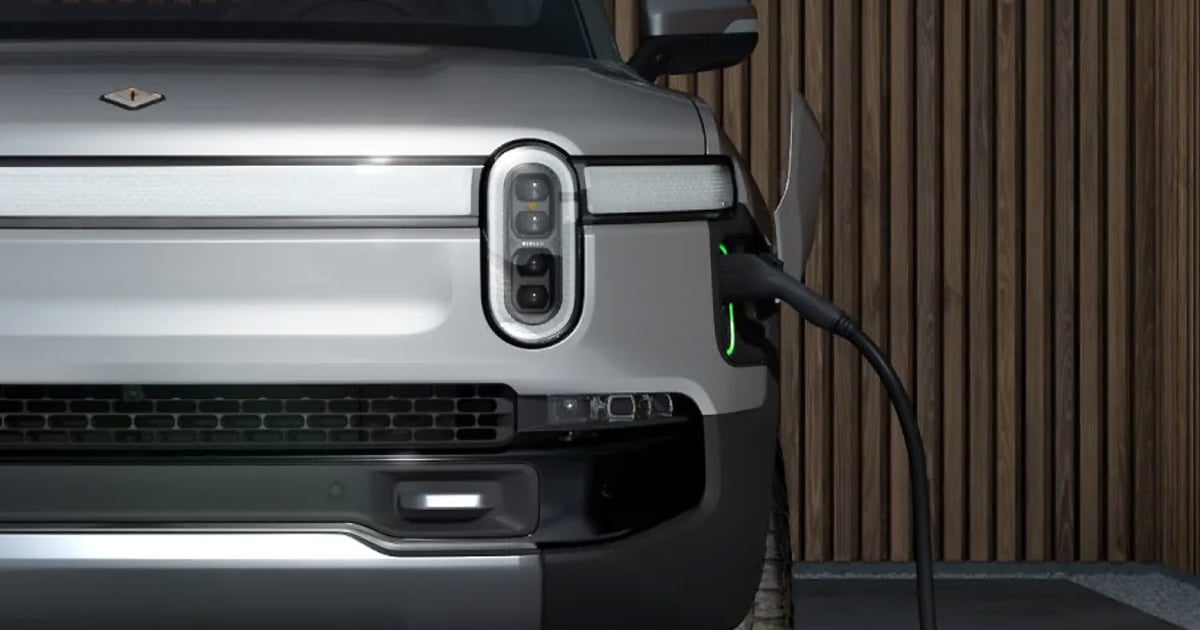
Rivian Automotive has reached an agreement to access Tesla’s Supercharger network starting next year and to incorporate Tesla’s charging port design into its future electric vehicles, following in the footsteps of Ford and General Motors, which cut similar fast-charge deals with Tesla over the last month.
Rivian said it will provide a charging adapter as early as spring 2024 for its current vehicles next year so they can access 12,000 Superchargers contemplated in the deal. Rivian currently uses the Combined Charging System port while Tesla uses its own North American Charging Standard.
“We’re excited to work with Tesla and to see collaborations like this help advance the world toward carbon neutrality,” said Rivian CEO RJ Scaringe in a statement Tuesday. “The adoption of the North American Charging Standard will enable our existing and future customers to leverage Tesla’s expansive Supercharger network while we continue to build out our Rivian Adventure Network.”
Rivian’s charging network is still very small and closed to outside users. Tesla’s network was closed to rival brands until a small, pilot project earlier this year using a built-in CCS adapter at a handful of Supercharger stations.
Tesla’s senior director of charging infrastructure, Rebecca Tinucci, said the agreement with Rivian and the other automakers shows the industry is converging around the North American Charging Standard, which will improve charging for all EV users.
“We’re collectively ensuring all EV drivers have access to easy to use, reliable charging hardware,” Tinucci said in the Rivian press release. “We look forward to welcoming Rivian owners to thousands of our Superchargers across North America.”
Shares of Rivian, of Irvine, Calif., rose 4.2 percent in early trading Tuesday. Tesla shares, which are up more than 40 percent since late May when the leading U.S. electric carmaker announced its deal with Ford, gained 1.5 percent.
The Rivian deal is the same as agreements Tesla made over the last month with Ford and GM, which surprised industry observers since there was little sign that non-Tesla automakers were ready to abandon the CCS standard they have been using on their electric vehicles.
Tesla has the biggest fast-charge network in the U.S. with over 17,000 individual chargers in the nationwide Supercharger network, according to iSeeCars. Charging networks using CCS, such as Electrify America and EVgo, have about 11,500 fast-chargers.
Tesla’s network has been rated as more reliable by independent studies and is growing considerably faster than competing networks. Tesla CEO Elon Musk has said Tesla is willing to open the Supercharger infrastructure to rivals in order to spur EV adoption, which will help all of the manufacturers.
Going mainstream?
Rivian is still a relatively small EV maker and had just 9,302 registrations for its high-end R1T pickup and R1S crossover in the January-April period, according to Experian. But the company is developing a more mainstream R2 platform for more inexpensive vehicles to be built at a future Georgia factory starting in 2026.
Rivian said in Tuesday’s press release that the R2 platform would incorporate the NACS standard, which is also being adopted by the makers of fast-charge equipment in order to supply non-Tesla charging networks.
Rivian also makes commercial vans for Amazon but did not mention them in its press release on switching over to the NACS standard. Amazon has its own charging structure for the vans. Rivian said in an email the collaboration with Tesla is only for R1 and R2 vehicles.
While Tesla is giving up a key competitive advantage by sharing its superior charging network some financial analysts have suggested that Tesla could turn charging into a bigger business. Tesla does not break out charging revenue currently as part of its earnings reports.
Ford announced its surprise Supercharger deal with Tesla in late May on Twitter, Musk’s social-media platform. Ford CEO Jim Farley joined Musk for the announcement.
“You and I have been talking about what we can do together to advance the industry and the customer experience,” Farley said to Musk. “It kind of became obvious to me the job your team has done and what it means for customers.”
GM followed with a similar announcement on Twitter Spaces between Musk and GM CEO Mary Barra.
Said Barra: “We have a real opportunity here to really drive this to be the unified standard for North America, which I think will even enable more mass adoption.”

